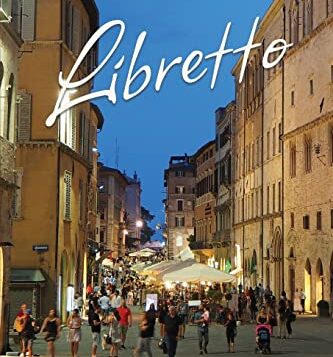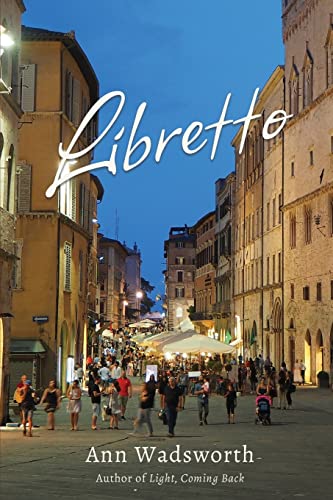THE WORD “OPERA” comes from the root op, meaning to work or to produce in abundance, as in “operation” or “cornucopia.” A profusion of dramatic plots in the context of a collapsing operatic production forms the backbone of this complex and engaging novel set in Italy, where opera began. Ann Wadsworth’s Libretto is the story of two women and a man with pressing work and relationship issues that they need to resolve together. If serendipity figures in their finding each other, intention takes over, and while significant loss occurs, so does heightened connection.
Libretto takes place in the ancient hilltop city of Perugia, capital of the Umbria region of central Italy, while the author’s first novel, Light, Coming Back, took place in her hometown of Boston. However disparate the two locales, both become the setting for major transformations. Libretto’s keenly observed details describe Perugia’s steep streets, blustery weather, cheek-by-jowl stone buildings, narrow passageways, and ubiquitous cafés. The action is said to have happened “some years ago,” but it’s hard to pinpoint precisely when. A reasonable guess might be the 1990s, as people are using computers and leaving messages on their phones (“telefoninos”), but they pull out paper address books and don’t exchange emails or search the Internet.
It’s clear from the start that Sirius is in trouble. In Vincent’s words, the situation suggests “a rattling car full of Keystone Kops headed for a cliff.” Crucially, the libretto has been found to lack enough narrative power to carry the opera’s story, but the librettist, a popular poet, is unwilling to make further revisions. In frustration, the opera’s composer has abandoned the whole effort and moved to Palermo—over 1,000 kilometers and a ferry ride away, in Sicily.
Into this jumble each main character brings personal apprehensions. Initially peeved at what sounded like a dull assignment, Ally finds herself bowled over by Perugia’s vistas, entranced by residents’ midday and evening passegiatta, or downtown strolls, and eagerly savoring local pasta and Umbrian wine. “The city itself is an opera,” she says. In this captivating atmosphere, she is drawn into a romantic fling with a young woman researching Italian labor unions for a postdoc degree in Syracuse, New York. Once their “passionate little affair” is over, however, the narrator wakes up to her approaching Opera News deadline and the need to pin down an interview.
Elaine, who has an ambitious, take-charge personality, worries about damage to her professional standing if the Sirius production collapses. Having gotten mediocre reviews for her most recent job directing an opera in the U.S., she is looking to save her reputation. When not coaching Sirius singers, Vincent is at work composing a chamber opera of his own, based on the William Trevor novella My House in Umbria. The musician is still mourning the loss of a beloved partner to AIDS a few years earlier and is under medical treatment to manage active tuberculosis. When Vincent meets Ally at a dinner party given by a wealthy opera patron, he introduces her to Elaine, and things take off.
Libretto’s plot runs from late summer to the following spring but builds between December 24th and the end of February. Wadsworth nicely knits crises of work and of affection as the story line grows complicated. For example, shortly after Ally and Elaine arrive in London for a brief Christmas holiday, they hear of Vincent’s hospitalization for a pulmonary hemorrhage. The women fly back to Perugia, where they find the musician “in acute respiratory distress.” Elaine, who had supported Vincent when his partner died and is in effect his health care proxy, joins in discussions with his physicians. Ally focuses instead on the musician’s yearning to complete his chamber opera. Setting aside the Opera News assignment, she offers to identify scenes in the Trevor novel that Vincent can set to music—maybe a “quartet for survivors”—and he accepts.
Through their efforts for Vincent, the women grow closer, and they become lovers. In short order this development is overtaken by upending news: the intractable Sirius librettist has broken into Elaine’s office, torn sheets of music and his 75-page contract to shreds, and smashed set miniatures—only to collapse with a heart attack or stroke and die. Appropriately enough, the New Year’s Eve rampage lights a way to shut down production. Elaine, the opera board, and their lawyers negotiate a binding cancellation of the opera that will satisfy the cast and allow all parties to move on.
Suddenly, there’s space for change. For one, Ally scoops an interview with the librettist’s reclusive sister, who discloses a shocking backstory. For another, Elaine secures an offer to direct an experimental opera in Brussels in the fall. A third change is ominous: Vincent’s weakening and sharp decline. At Elaine’s urging, with Ally’s support and opera patron funding, the musician moves into an elegant villa not far from Perugia, with views of the Apennines, for terminally ill residents. With no chance of recovery, Vincent focuses on hearing his chamber opera songs performed. Despite brutto March weather, the performance takes place, right in the villa, and his music draws wild applause. Ally and Elaine, who now recognize both their differences and their mutual commitment, start figuring out a life together.
Libretto is filled with dramatic complexity, but Wadsworth steers the story to resolution, clarifying subplots with brief recaps. Her dialogue comes across as direct and sophisticated, reflecting careful observation of how people talk, with curiosity and brisk ripostes. Like the narrator in Light, Coming Back, Ally comes to understand “old perceptions of love and loss” and to imagine new possibilities for her vagabond writing life.
Rosemary Booth is a writer and photographer living in Cambridge, MA.





